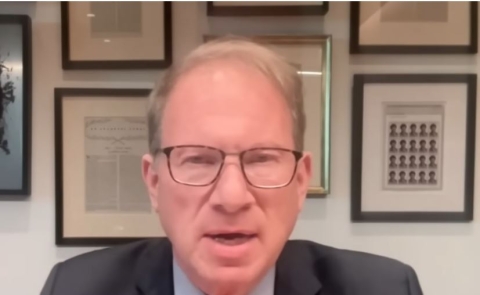


On Monday, The Atlantic’s Editor-in-Chief Jeffrey Goldberg confirmed with the Trump Administration that national security was breached by his accidental inclusion in a text message group initiated by National Security Adviser Michael Waltz – 13 days after he first suspected his inclusion was a mistake.
Instead of immediately addressing the national security threat by asking Waltz if his addition to a Signal text messaging app group was a mistake, Goldberg apparently waited nearly two weeks – all the while suspecting that national security was being breached – before bothering to contact Waltz and other high-ranking officials to question his inclusion in the group.
Two hours after his inquiry on Monday, the Trump Administration replied, confirming he was added to the group inadvertently. Goldberg, then, promptly published his story, titled “The Trump Administration Accidentally Texted Me Its War Plans”:
“The world found out shortly before 2 p.m. eastern time on March 15 that the United States was bombing Houthi targets across Yemen.
“I, however, knew two hours before the first bombs exploded that the attack might be coming. The reason I knew this is that Pete Hegseth, the secretary of defense, had texted me the war plan at 11:44 a.m. The plan included precise information about weapons packages, targets, and timing.”
In his article, Goldberg concedes the danger to national security posed by the breach:
“Conceivably, Waltz, by coordinating a national-security-related action over Signal, may have violated several provisions of the Espionage Act, which governs the handling of ‘national defense’ information, according to several national-security lawyers interviewed by my colleague Shane Harris for this story.”
After receiving the Signal connection request, Goldberg:
Who knows how many unscrupulous characters accessed other group chats during that time, due to the faulty invitation process?
According to his own timeline account, Goldberg simply monitored the potentially-sensitive text exchanges until after the military strikes and waited a total of13 days before calling attention to the mistake that made him privy to the conversations:
Thus, by his own admission, Goldberg received and accepted the invitation to the Signal message group on Tuesday, March 11 – then waited until March 24 to confirm the authenticity of the group and whether his invitation to it was intentional. Obviously, Goldberg knew how to contact Waltz and the other high-level officials, because he did.
And, while Goldberg removed himself from the Signal group on March 16, the day after the U.S. military strikes, he then waited another eight days (until Monday, March 24) before contacting Waltz, et al – the same day he published his story.
Also on March 24, The Atlantic published “A Conversation With Jeffrey Goldberg About His Extraordinary Scoop,” in which Goldberg is interviewed by Staff Writer David A. Graham.
In the interview, Goldberg says it was on Saturday, March 15, that he realized both that the Signal channel was “almost certainly” real – and that he was going to write a story about it:
“I check on X around 1:55, and yes, Sanaa is being bombed, so then I have the realization that this is almost certainly a real channel and not just an elaborate fakery of some sort. And that's when I began to realize that I had to write about this massive security breach.”
The timeline Goldberg reports in his article exposing a “massive security breach” raises an important question:
Did The Atlantic’s Editor-in-Chief prioritize personal gain over national security by continuing to monitor the messages for five days and waiting 13 days before notifying National Security Adviser Waltz and the other administration officials?
